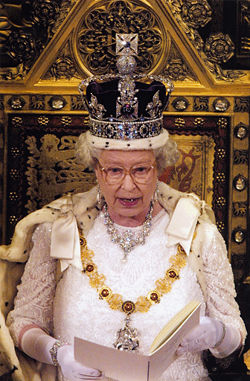Monarchy of the United Kingdom

The monarch visits Parliament annually in a ceremony to begin parliamentary proceedings. During this State Opening of Parliament, the Queen's Speech sets out her government's intentions for the coming year.
The monarchy in the United Kingdom and its territories is an institution which provides the British head of state as a king or queen with ceremonial powers. The government of the United Kingdom runs the country in the name of the monarch. The monarchy is therefore a constitutional monarchy, having no real political power, but the Royal Family performs a variety of duties. Since 1952 the head of state has been Elizabeth II, one of the longest-reigning monarchs in world history. She is also Queen of Australia, New Zealand, Canada and 12 other sovereign nations, as well as being head of the Commonwealth of Nations and the Church of England.
The British monarchy is hereditary, in that the eldest son of the monarch has usually become King. For centuries, a daughter would only become Queen if she had no brothers. However, on 28th October 2011, the Queen's 16 prime ministers agreed to bring in legislation to change this. The current heir apparent to the throne is Charles, Prince of Wales.
History
The constitutional status of the Crown
The Royal Prerogatives
The royal prerogatives operate in three distinct ways, as the sovereign’s constitutional prerogatives, as the legal prerogatives of the Crown, and as the legal prerogatives of the Crown[1].
The sovereign’s constitutional prerogatives
The personal discretionary powers of the Sovereign include the rights to advise, encourage and warn Ministers in private; to appoint the Prime Minister and other Ministers; and to assent to legislation. The Sovereign may, in a grave constitutional crisis, act without or against ministerial advice. In ordinary circumstances, however the Sovereign, accepts and gives way to Ministerial advice.
The legal prerogatives of the Crown
There is a range of traditional legal prerogatives which can be exercised by the Crown. They include the principle that the Crown can do no wrong, and that the Crown is not bound by statute "unless named". Many of them been amended by parliament and many are obsolete.
The prerogative executive powers
Prerogative powers that are used by Ministers as agents of the Crown include:.
- The making and ratification of treaties (subject to the provisions of Constitutional Reform and Governance Act 2010[1]);
- The conduct of diplomacy, and the appointment of ambassadors and High Commissioners.
- The declaration of war;
- The use of the armed forces in support of the police;
- The appointment and removal of Ministers by the Prime Minister;
- The granting of peerages, and honours;
- The granting of pardons and the Attorney-General’s power to stop prosecutions.
Those powers may be exercised without the prior assent of Parliament but Ministers may be accountable to parliament for their application.